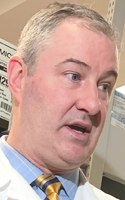By Payne Horning

Scientists at the Walter Reed Army Institute of Research have created a heroin vaccine specifically designed to prevent the drug’s psychoactive effects. If successful in humans, the vaccine would stop heroin’s addictive qualities. Doctors at Upstate Medical University are now involved in the study and may soon oversee human trials of the vaccine.
Physician Stephen Thomas, a professor of medicine and microbiology and immunology at Upstate, is in charge of the project. He got involved after contacting a former colleague at Walter Reed, where he had spent 14 years of his 20-year career.
“I called him back up and asked if he was still working on it,” Thomas said. “He said yes, and we’ve had great success in mice and rats and we are at the stage where we need to think about how we are going to transition this to clinical development. And I said this is perfect timing then because we are in the midst of an epidemic up here.”
Thomas is neither a toxicologist nor an addiction expert, but he has not been immune from the fallout from the opioid public health epidemic. As head of the division of infectious disease at Upstate, Thomas is regularly consulted to help deal with the far-reaching complications caused by opioid abuse. Heroin users who inject unsafe substances with dirty needles often inadvertently place bacteria in their blood, causing the accumulation of large collections of infected fluid in their spine, bones and brains.
“Now what happens is the person is in the intensive care unit,” Thomas said. “They are calling the infectious disease doctor, they’re calling a cardiothoracic surgeon, they’re calling in a kidney specialist — all of these different disciplines that in the relatively recent past weren’t being exposed to this type of population of people are now [called] to stop them from dying. It’s absolutely a crisis.”
Heroin is an opioid drug made from morphine that is injected, inhale or smoked. According to the National Institute of Drug Abuse (NIDA), the number of deaths related to the drug more than doubled in New York state to 1,307 from 2012-2016. New York state allocated $247 million in last year’s budget alone to combat the scourge of opioids.
Thomas believes the heroin vaccine could help alleviate this problem. Based on what researchers have found in the animal studies, the heroin vaccine works similarly to other vaccines designed to fight infectious diseases. A protein that mimics and looks like the active metabolite of heroin is packaged into a vaccine and injected into the blood. The body’s immune system then mounts a response to the heroin-like protein by manufacturing antibodies that attach to it, preventing the metabolite from crossing the blood-brain barrier. That prevents the euphoria or high associated with the drug when the actual heroin metabolite is injected into the body.
Upstate has been awarded a $3.7 million preclinical grant from NIDA, which covers everything before the human testing. The researchers will use that funding to finish the animal testing, manufacture the vaccine, and put together the proposal for how to test the heroin vaccine in humans. The U.S. Food and Drug Administration will then review the application and determine whether or not to fund the execution of that plan, which could start as soon as 2020.
Thomas says the human study would likely involve a large group of heroin users who have committed to rehabilitation. Half of them would receive the vaccine plus the current standard of care for opioid addiction treatment, and the others would receive a placebo plus the current standard of care for opioid addiction treatment. The team leading the study would then track the groups and record the number of remissions in each, ultimately with the goal of determining if there is a statistically significant difference between them or not. Among the questions they hope to answer are how long the effects of the vaccine last and how often it needs to be administered.
Even if the vaccine does prove to be successful, Thomas says it is not a “magic bullet.” The medication would need to be administered as part of a comprehensive treatment, such as counseling, to treat the underlying substance abuse disorder. But he says it could play an integral role in helping those who are struggling to stay sober.
“Knowing that recovery is often a try-fail cycle, maybe this could be a powerful tool to make that cycle shorter in duration, and maybe we can help people on the first try and avoid the devastating health and family and community suffering that goes along with the epidemic,” Thomas said. “That would be the hope.”
Thomas says a secondary and perhaps more ambitious goal of the study is to learn how to replicate this formula to make vaccines for other substances that people abuse. Theoretically, he says, it could be developed to combat the effects of other deadly drugs like fentanyl.
